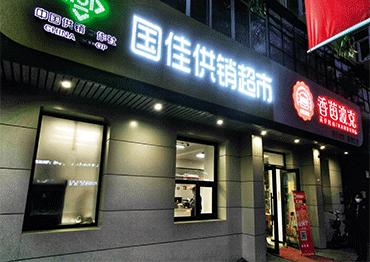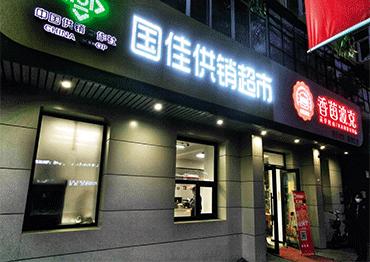Within a month, two senior officials from provincial supply and marketing cooperatives in Heilongjiang were removed from their posts and placed under investigation.
On September 1, the provincial discipline watchdog announced that Wang Guizhi, deputy Party chief of Heilongjiang Supply and Marketing Cooperatives Federation had been prosecuted for taking a colossal amount of bribes, although the amount was not revealed. Ten days before, the institution’s former Party chief Zhang Wenming, who retired three years earlier, was put under investigation for serious violations of discipline and law.
According to incomplete statistics collected by NewsChina reporters, at least five officials at the provincial level and 10 officials at the prefecture level in the co-op system have been disgraced over the past five years, and now the sector has become a new area of investigation for China’s anti-graft regulators.
Established in the 1950s, China’s supply and marketing cooperatives serve as the main circulation system for goods and commodities in rural areas, with distribution systems at the national, provincial, city, county and township level. At one time, it was the only way to purchase agricultural supplies and daily necessities in China, making it crucial for farmers’ lives and work.
In 1978, its monopoly on the sales of agricultural goods including fertilizers and seeds came to an end, and most co-ops have struggled to survive ever since. Government data showed that from 1992 to 1999, supply and marketing cooperatives at different levels incurred economic losses of 45 billion yuan (US$6.7b) across the country and nearly half of all 5.8 million co-op employees lost their jobs.
China started reforming supply and marketing cooperatives in 2010. Many provinces and cities applied the “internet plus” concept - using tech applications in conventional industry - to save the flagging co-ops. A growing number of cooperatives turned deficits into surpluses. In 2014, Heilongjiang cooperatives had a total sales volume of 56.3 billion yuan (US$8.4b), an increase of 10 percent year-on-year.
A senior official at Heilongjiang provincial co-ops who declined to be named told NewsChina that to date, they had discovered that over 3 billion yuan (US$449m) had been misused. Both Zhang Wenming and Wang Guizhi were investigated “mainly because of the loss of those assets.”
In May 2019, Gao Shouliang, former chairman of the Beijing Federation of Supply and Marketing Cooperatives, was prosecuted for accepting bribes of 180 million yuan (US$27m). In many localities, heads of the supply and marketing cooperatives had wielded enormous power and were largely free from supervision by the State-owned Assets Supervision and Administration Commission.
In August 2014, the Beijing Federation of Supply and Marketing Cooperatives provided a credit guarantee of 400 million yuan (US$60m) for a company that Gao supported after he strongly recommended providing the credit guarantee.
The organization’s deputy Party chief, however, claimed later that he did not even know the name of the company. In another case, Qin Yabing, former head of the supply and marketing system in Ningxia Hui Autonomous Region, never allowed discipline inspectors to attend important meetings.
Liu Xuan (pseudonym), a former employee with Heilongjiang cooperatives told our reporter that leaders in the system are prone to corruption largely due to the long tenure of the management in the agency.
Among the leaders who were relieved from their posts, Liu Jinshui had been working as Party chief of the cooperatives in the Inner Mongolia Autonomous Region for 13 years. Tang Limin, former deputy director of the co-ops, served 19 years. The duo acted in collusion for more than 20 years. Liu Guocheng, former Party chief of cooperatives in Sichuan Province, was arrested in early 2019 for bribery after working in the agency for 40 years, including eight years as a top leader.
“In comparison with departments of transport and finance, supply and marketing co-ops have relatively limited power. Corruption in the system is closely linked with its business,” a former discipline inspector with the Heilongjiang provincial Party committee told NewsChina on condition of anonymity.
Tong Baojun, former chief discipline inspector at the All-China Federation of Supply and Marketing Cooperatives (ACFSMC), said that “it is difficult to effectively supervise the projects and money of the supply and marketing cooperatives alongside the sector’s rapid development, which has brought difficulties and risks to the anti-graft campaign.”
As of the end of 2007, China was home to 17,730 enterprises affiliated to supply and marketing cooperatives. In April 2014, the State Council, China’s cabinet, turned the provinces of Hebei, Zhejiang, Shandong and Guangdong into pilot zones to reform the co-op system which has since driven the sector’s rapid development across the country.
According to statistics from the ACFSMC, sales of supply and marketing cooperatives nationwide hit 5.9 trillion yuan (US$883b) in 2018, registering profits of 46.8 billion yuan (US$7b).
Meanwhile, e-commerce sales totaled 299.8 billion yuan (US$44.9b), financial services turnover hit 97 billion yuan (US$14.5b) and real estate development revenue reached 21.9 billion yuan (US$3.3b). Supply and marketing co-ops across the country have expanded their business to other areas, including logistics, chemical products, auto production and petroleum.
Tong Baojun researched the system in many places in 2012 and found that a major indicator of corruption is the loss of assets. According to legal website China Judgments Online, from September 2014 to September 2015, Qin Yabing, former director of Ningxia cooperatives, underwrote loans to private companies without permission from other management, incurring losses of 213 million yuan (US$32m).
According to a report in the China Discipline Inspection Daily, when Gao Shouliang was in charge of the Beijing Federation of Supply and Marketing Cooperatives, he was arbitrary in making decisions and the organization eventually accrued debts of over 18.2 billion yuan (US$2.7b).
Tong Baojun, former chief discipline inspector at the ACFSMC, argued that over the years, supply and marketing cooperatives were neither considered to be government organs nor public institutions, associations or enterprises, which allowed them to become a gray zone when it came to effective supervision.
“The supply and marketing cooperatives in some places are like untended vegetable gardens,” said the former discipline inspector of the Heilongjiang provincial Party committee.
In June 2020, Yu Hongqiu, chairman of the ACFSMC, announced that within three years, 7,000 new supply and marketing cooperatives at the grassroots level will be established across the country for a total of 39,000. In Heilongjiang, there were 926 co-ops at the township level, covering all towns and villages in the province, a growth rate of 65 percent year-on-year.
In a visit to Heilongjiang, NewsChina reporters found that many grassroots supply and marketing co-ops are operating in the red. Zhang Junyi, a former employee at a township co-op under the city of Wuchang, told the reporter that the main income of co-ops comes from two sources - rents and sales of agricultural production materials.
“Nowadays, a growing number of farmers have moved to counties and cities and rents are low. The director of our supply and marketing co-ops earns only 1,000 yuan (US$150) a month and the deputy head earns even less,” he said. Over the years, the main source of income of co-ops in rural areas comes from the rent they collect from housing.
In March 2020, Zhou Tianyong, a professor at Dongbei University of Finance and Economics in Dalian, Liaoning Province, argued in an article for aisixiang.com that China’s supply and marketing cooperatives system is a relic of the planned economy unsuited for the market economy.
“Government grain warehouses and State-owned farms coupled with supply and marketing co-ops are areas prone to corruption, which have high costs [in terms of manpower] of discipline supervision,” he said.
“It is high time to forestall rent-seeking and scams in seeking financial subsidies in order to really benefit and meet the needs of people in rural areas.”

 Old Version
Old Version
